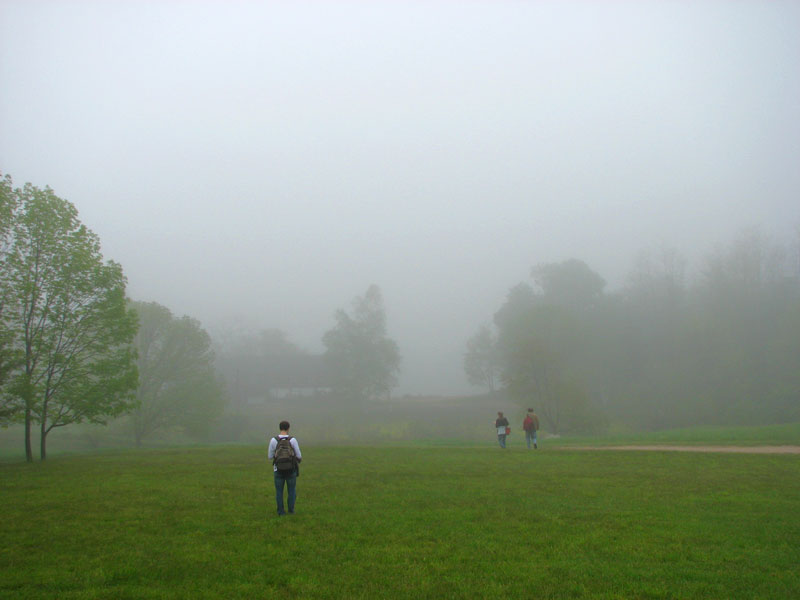
Among the many, many reasons you should feel sorry for me is the fact that I never went to camp as a child. In Britain, people just didn't send their kids off to camp. (They may today, but I'm not certain.) When we moved to the states when I was about 10, camp was a distinctly American tradition, largely saved for people who had the means and, I thought, didn't like their kids so much. So while a handful of my friends trotted off to camp for weeks on end during the summer, I remained behind, largely puzzled and only mildly envious. I wasn't sure I'd enjoy camp nor was I sure why kids would want to sleep in bug-filled cabins, swim in murky lakes and fashion macrame bracelets when they could stay indoors all summer watching sitcoms.
So you can imagine it was a little odd and, surprisingly, a little thrilling for me to shop for my trip up north to the Bear River Writer's Conference at Camp Michigania last weekend. As I tossed bug spray into my basket at Target and mulled over the right flashlight to take (who knew there were so many flashlights?), Chris assured me that if I got lonely and the other writers made fun of me, I could come home at anytime.

As it turns out, the conference was a terrific experience. For the past few years, I've made a point of attending a summer writing workshop, saving my pennies and signing up for five-day sessions at the Iowa Summer Writing Festival. But at the urging of the generous and lovely Nick Delbanco, I opted for Bear River this year -- largely because the special guest was, as I've noted here, one of my favorite authors, Amy Hempel.
One of the unique things about Bear River, as compared with other writing conferences and workshops, is that it focuses squarely on producing new work. It's not the place to drag along the manuscript you've been working on merely to expose it to a new set of critical eyes -- or as often happens, let's face it, in the hopes of receiving unqualified praise and encouragement. Instead, it's about inspiration, greasing the wheel and writing on the spot. Which is just as well, because I'm so far behind where I'd like to be with my current writing project that being in an environment that forced me to exercise my writing muscles was precisely what I needed.

I took a workshop on Painting and Fiction with Elizabeth Kostova, she of the best-selling vampire epic, The Historian. It was, in retrospect, perhaps not precisely the right workshop for me. While I thought we would focus on how the process of writing compares with the process of painting, and how the latter could inform and influence the former, the workshop leaned more strongly towards the use of paintings in our writing -- as inspiration but, more directly, as subject. And I confess to being surprised by the number of people in our ten-person group who were specifically interested in including paintings in their fiction, for the most part in historical novels.
But the experience of attending Bear River was still good for me for two key reasons. First, I tend to forget that I know how to write. As silly as that may sound, and despite the fact I make my living as a freelancer, I do. I get so cowed by my fears and what feels like the weight of writing that I forget I'm even capable of it. Confidence among writers -- more specifically, among this writer -- is so fleeting, so difficult to maintain. Our free writing exercises and our homework, as rusty and slap shod as they were given time restraints, reminded me that I can do this, that I can string words together.

The second reason is that I remembered I like to be around people and that I am, for the most part, pretty good at it. As someone still relatively new to Ann Arbor and who works from home, I spend a tremendous amount of time by myself. Most of my time, in fact. Again, my memory proves tricky and, locked away in my office typing on my keyboard, I forget that I can meet new people, that I can make conversation with strangers and that I am, at least as a general proposition, likeable. I forget that I'm funny. I forget that I can find things in common with writers from all different backgrounds, from all walks of life, with all different interests. I was fortunate to be paired with cabin mates who were friendly and funny and I crossed paths with all sorts of interesting folk I'm grateful to have known, however briefly.
I think when I sit at home alone in my office, my fear can so easily eclipse my passion and, as a result, my productivity (which is weak under the best of circumstances) grinds to a halt. Over dinner the night of my return, Chris noted the extent to which I come home from these things energized and excited about writing and he suggested I look for at least one more to attend during the year. Such a smart man that husband of mine. (If you have any suggestions for great writing workshops, perhaps during the winter to balance my summer excursion, please let me know!)

Of course, the real initial draw for me to Bear River was the chance to meet Amy Hempel. She is, as I've noted here, pretty much the reason I wanted to become a writer. And when I glimpsed her across the room the first night -- petite and pretty beneath a mass of long white hair -- I was practically catatonic. I became a bumbling dork, moving closer to where she sat and glancing furtively at her out of the corner of my eye.
By the second day I worked up the courage to assault her, just as she was on the way into the craft talk she was scheduled to give. Clutching my hard copy of her collected stories, I blabbered on, slathering her with praise and actually (I kid you not) getting misty as I spoke with her. She was, fortunately and not surprisingly, extremely gracious and was kind enough to sign my book rather than having me escorted from the building.
I have to say, even in my starry-eyed state, I found her craft talk a little hard to follow. She warned us at the start that it would not be linear as she doesn't think in a linear way and, in turn, doesn't write linear stories. And while that's part of what I admire most about her stories -- along with her use of humor and pathos and her ability to plum the depths of emotion without being sentimental -- it doesn't necessarily make for a riveting craft talk. I came away with a page full of notes that included the names of poets she likes, some quotes from writers and not much sense of how Amy Hempel writes or how to apply it all to my own writing life. While a tad disappointing, it was also somehow comforting. I'm not sure that I want my writers to be completely polished, to be dazzling orators, to be good at every mode of expression. It helps to know they are imperfect in life, even as I may make them perfect on the page.
Hempel also did a reading in the nearby town of Petoskey, along with the very funny and talented poet Jim Daniels, at the Crooked Tree Arts Center. It was a brief but enjoyable reading and the Center is stunning -- a Victorian church repurposed, and beautifully so, into a community Arts Center with a small stage and gallery space. I have a feeling the world might be a much better place if we repurposed all the churches in this manner. (We also had time to visit the current show, a collection of photographer Bill Eppridge's 1968 campaign photos of Robert F. Kennedy. Extremely moving and while it could be argued that I've been crying at everything of late, I'm certain this would have yielded the same results under any circumstances.)

The Bear River experience was so different from that of the Iowa workshops I've attended and, at the risk of blasphemy (although, given the previous paragraph, that may seem a disingenuous concern), I enjoyed it far more. At Iowa, the workshops and homework seemed a bit more intensive, but once you're outside of the classroom, you're largely on your own. Everyone stays different places and no meals are provided and although the isolation can prove productive, it can also be, well, extremely isolating.
At Bear River, you share a cabin (that's mine above, #14) with other writers and take all your meals in the dining hall. (You can, of course, skip them if you like and wander off grounds or hole up in your cabin with a bag of nuts, so to speak.) The result is a much greater sense of community. With about 90 attendees, by the end of four days, you know just about everyone by sight if not by name. And while I'm blaspheming, I'll even go so far as to suggest that, in my limited experience, the overall talent at Bear River was superior to what I've encountered thus far at Iowa. Again, no offense. To anyone. Anywhere. Ever.

In addition, the setting is so bucolic, with meandering camp grounds along the shore of the same Lake Walloon that inspired Hemingway. I found it a great deal more inspiring than the campus of the University of Iowa, with its sterile air-conditioned classrooms, and the surrounding streets of Iowa City. (No offense, Iowa City.) Even on the rainy days -- and two out of the four were overcast and drizzly -- there was a mysterious fog that settled over Camp Michigania of precisely the sort we writers enjoy. Each morning, whether the lake was illuminated by the beating sun or hidden by mist, I felt a deep sense of peace as I trudged through the wet grass, warm coffee in hand, across the wooden foot bridge to my workshop in north camp. I don't necessarily make a habit of communing with nature -- we've found we don't often have much to say to one another -- but it was beautiful and quiet and I loved it.

On the last day, as tends to happen at these things, participants signed up to read their work. (I never sign up for these things; I'm never sure I have anything I want to hear myself read.) While these things are always hit and miss, I was blown away by some of the writing, and especially moved by the funny, smart, emotionally surprising work of the Ann Arbor Youth Poetry Slam team members who were there. I'd seen these teenage boys bumbling around camp for three days, wondering who on earth were these yahoos playing football with a soda bottle on the front lawn -- only to be wowed into reticence and deep admiration by their rhythm, vocabularies, perspectives and humor. (If you're in Ann Arbor, you should find a way to check them out.)
Unfortunately, a pall was cast over our last afternoon when a woman suffered what turned out to be a cerebral hemorrhage while reading her poem. It was scary and threw everyone off and even though the evening's reading continued as scheduled, I think we were all a bit shaken and worried. We learned at breakfast our last day, before heading out, that she'd been airlifted to a hospital in Detroit and was in critical care. Should anything awful happen as a result, I hope there's some comfort to be taken in the fact that she was doing what she loved when tragedy struck.

 Next up was Stewart O'Nan's "Songs for the Missing." Chris returned with it from a road trip, saying he saw it and thought I might enjoy it. Now, since I'm the sort of stubborn ass who decides not to see a great movie just because so many people have told me I SIMPLY MUST SEE IT, it's not surprising that I was a little turned off by Chris' certainty. I mean, what? Just because we've been together for a decade, he suddenly knows so much about me?
Next up was Stewart O'Nan's "Songs for the Missing." Chris returned with it from a road trip, saying he saw it and thought I might enjoy it. Now, since I'm the sort of stubborn ass who decides not to see a great movie just because so many people have told me I SIMPLY MUST SEE IT, it's not surprising that I was a little turned off by Chris' certainty. I mean, what? Just because we've been together for a decade, he suddenly knows so much about me?
 Then it arrived. It arrived. Oh, I'd been waiting for this book for so very long. Fifteen years if you wanna get technical about it: Lorrie Moore's long-awaited new novel, "A Gate at the Stairs."Â I should warn you that I can't even pretend to be objective about this book. Moore's one of my all-time favorite writers. She and Amy Hempel were just two of the young female voices emerging in the early eighties, showing me that women could write and they could write like this -- in a brave, honest way I hadn't known was possible before. With humor and grace and simplicity and irony.
Then it arrived. It arrived. Oh, I'd been waiting for this book for so very long. Fifteen years if you wanna get technical about it: Lorrie Moore's long-awaited new novel, "A Gate at the Stairs."Â I should warn you that I can't even pretend to be objective about this book. Moore's one of my all-time favorite writers. She and Amy Hempel were just two of the young female voices emerging in the early eighties, showing me that women could write and they could write like this -- in a brave, honest way I hadn't known was possible before. With humor and grace and simplicity and irony.
 I switched gears after Moore's book even though I have Richard Russo's "That Old Cape Magic" just begging to be broken into. I felt I wanted to cling onto whatever I got from the former and so I thought I'd go memoir with my next selection and, timing being everything, it worked out perfectly that Hope Edelman's "The Possibility of Everything" was out by the time I finished "A Gate at the Stairs."
I switched gears after Moore's book even though I have Richard Russo's "That Old Cape Magic" just begging to be broken into. I felt I wanted to cling onto whatever I got from the former and so I thought I'd go memoir with my next selection and, timing being everything, it worked out perfectly that Hope Edelman's "The Possibility of Everything" was out by the time I finished "A Gate at the Stairs."
 A few months ago, I got an email from
A few months ago, I got an email from 

 Kids are so wise, aren't they?
Kids are so wise, aren't they?







